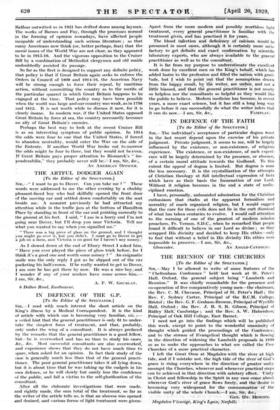IN DEFENCE OF THE FAITH
. _
[To the Editor of the SPECTATOR.] SIR,—The individual's acceptance of particular dogma must in the last resort depend upon the exercise of his private judgment. Private judgment, it seems to me, will be largely influenced by the existence, or non-existence, of religious experience. The existence, or non-existence, of such experi- ence will be largely determined by the presence, or absence, of a certain moral attitude towards the Godhead. To this extent the appeal of dogma is limited. But dogma is none the less necessary. It is the' crystallization of the attempts of Christian theology at full intellectual expression of factS which have as their basis the Incarnation of our Lord. Without it religion becomes in the end a state of undis- ciplined emotion.
. I have, personally, unbounded admiration for the Chriitian enthusiasm that chafes at the apparent formalism and unreality of much organized religion, but I would suggest that the cure for these evils does not lie in the curt dismissal of what has taken centuries to evolve. I would call attention to the warning of one of the greatest nioaern: mission preachers, Fr. Vernon, S.D.C., when he remarked that people found it difficult to believe in our Lord as divine ; so they scrapped His divinity and decided to keep His ethics—only to find that without a belief in His divinity His ethics were impossible to preserve.—I am, Sir, &c.,
























































 Previous page
Previous page